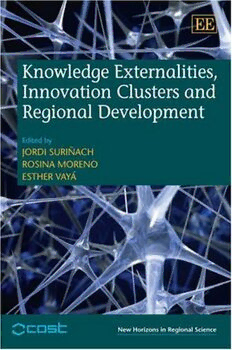
Knowledge Externalities, Innovation Clusters and Regional Development PDF
320 Pages·2007·2.194 MB·English
Most books are stored in the elastic cloud where traffic is expensive. For this reason, we have a limit on daily download.
Preview Knowledge Externalities, Innovation Clusters and Regional Development
Description:
This book begins with a theoretical examination of regional innovation systems, agglomeration economics and knowledge spillovers, before going on to examine the same concepts within an empirical framework. Special emphasis is given to the importance of proximity in the formation of regional innovation systems. It concludes by considering innovation and human capital as determinants of regional economic growth. The concept of knowledge spillovers is used within the book to explain a number of major economic phenomena, including the geographical clustering of inventions; the social returns to R&D that significantly exceed private returns; and the sizeable disproportions that exist between firms in terms of their R&D inputs and outputs. The authors identify that small firms are responsible for far more product innovations than large firms relative to their measurable knowledge resources. The book also stresses the importance of a catch-up mechanism that sees technological improvement as the combination of two distinct types of activity: innovation and imitation. In this way, the impact of human capital and other types of knowledge acquisition on economic growth is measured. The conclusions of the authors are invaluably oriented to policy implications. This book will appeal to researchers and postgraduate students of regional science and innovation and knowledge, as well as policymakers.
See more
The list of books you might like
Most books are stored in the elastic cloud where traffic is expensive. For this reason, we have a limit on daily download.
